Physical Address
304 North Cardinal St.
Dorchester Center, MA 02124
Physical Address
304 North Cardinal St.
Dorchester Center, MA 02124
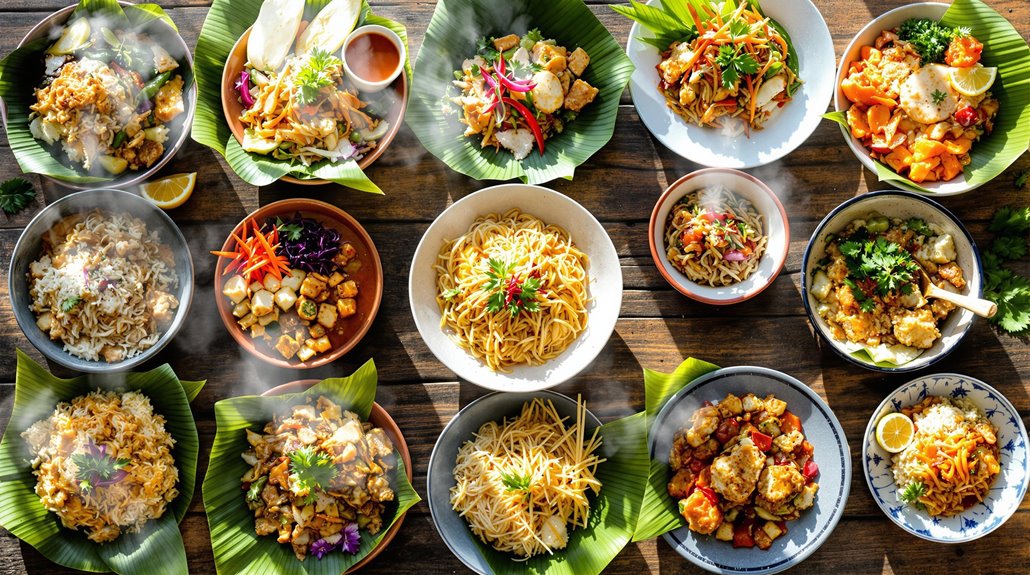
From Bangkok's Michelin-starred Gaa to Bali's eco-conscious Zest Ubud, Southeast Asia's top vegan restaurants offer extraordinary plant-based experiences. You'll discover innovative fusion at Bangkok's Vistro, temple-inspired cuisine at Seoul's Sanchon, and farm-to-table delights at Green Light Café. Don't miss Toyo Eatery's Filipino tasting menu, Fat Choi's Nyonya wontons, or Atsumi Raw Café's tropical creations. These culinary destinations showcase the region's most creative and conscious dining, with even more gems waiting to be explored.
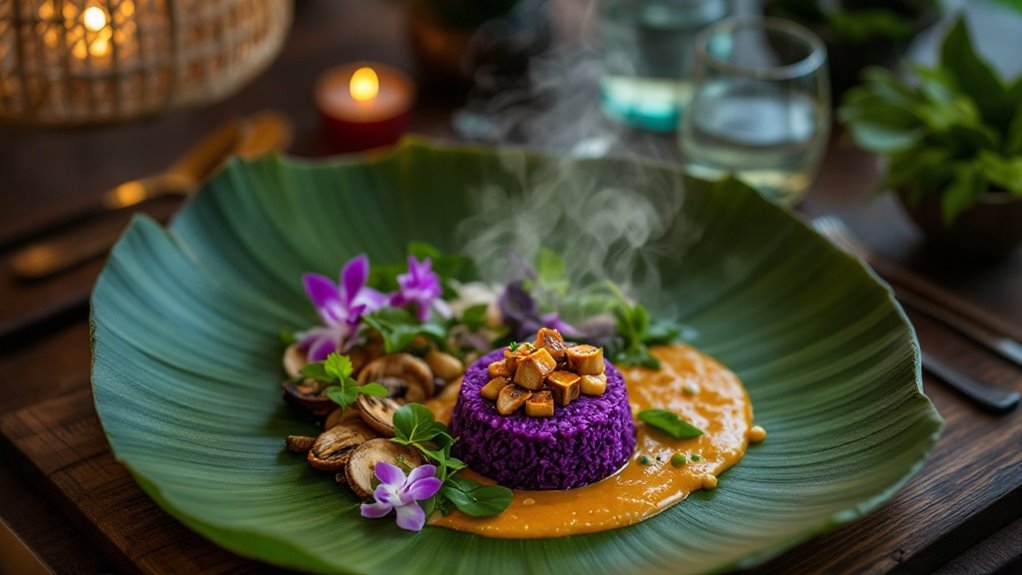
While Southeast Asia's lively street food scene often steals the spotlight, the region's upscale plant-based dining establishments are crafting innovative experiences that elevate traditional flavors to new heights.
In Manila, you'll discover Toyo Eatery's masterful vegan tasting menu, which reimagines Filipino rural cooking with contemporary flair. The restaurant's dedication to sustainable sourcing ensures each dish reflects both environmental consciousness and culinary excellence.
Bangkok's dining scene shines with Veganerie Concept, where you'll experience sophisticated Western-Thai fusion in an elegant setting. Drawing inspiration from Tokyo's vegan cuisine, the chefs create dishes that blend Japanese minimalism with bold Thai flavors.
The creative minds at Vexy and Vistro have transformed Bangkok's fine dining landscape, offering inventive plant-based interpretations of beloved Asian dishes.
For an immersive experience, don't miss Waki Waki Veggie Sushi, where traditional Japanese techniques meet Southeast Asian ingredients to create stunning vegan presentations that rival their conventional counterparts.
Throughout Southeast Asia's bustling streets and night markets, you'll come across an impressive array of naturally vegan delicacies that have been staples of local cuisine for generations.
You can start your culinary adventure with Cambodia's steamed peanuts and chive cakes, or try Thailand's crispy Tau Hu Tod served with rich peanut sauce. Don't miss Indonesia's tempeh skewers, grilled to perfection with aromatic soy glaze. For maximum environmental impact, consider bringing your own reusable cutlery set when sampling these street delights.
For those with a sweet tooth, you'll encounter delightful treats like Thai Khanom Krok, coconut-rice pancakes with perfectly crispy edges, and Malaysia's beloved Ondeh-Ondeh, pandan-scented rice balls filled with melted palm sugar. Vietnamese street vendors often prepare vegan rice noodles using traditional family recipes passed down through generations. The Delicious Vegan Eats movement has transformed the street food scene across the region. In Siem Reap, Temple Town offers an abundance of plant-based local specialties at its vibrant night markets.
When you're seeking heartier options, Vietnam's Banh Mi Chay offers a satisfying twist on the classic sandwich, while Indonesian Gado Gado provides a wholesome meal packed with tempeh and fresh vegetables.
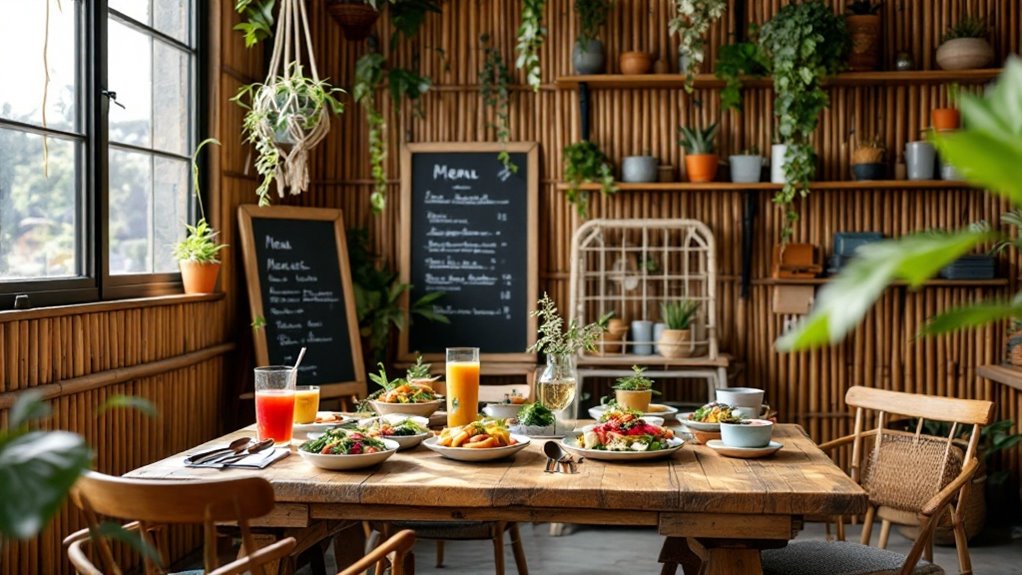
Beyond the lively street food scene, Southeast Asia's eco-conscious vegan cafes are revolutionizing sustainable dining practices.
You'll discover inspiring establishments like Green Light Café, where you can tour their on-site organic gardens, and Zest Ubud, which sources 90% of ingredients locally while maintaining a fully plant-powered kitchen. At Karma Waters in Hoi An, visitors can support charitable initiatives while enjoying their fully vegan menu.
At Eleven One Kitchen in Cambodia, you can enjoy MSG-free dishes made with ingredients sourced directly from local farmers, while Verde Kitchen guarantees every ingredient meets strict organic standards. Northern Thailand's capital has emerged as a leading destination for plant-based dining with numerous ethical eateries.
For raw foodies, Alchemy Bali serves unprocessed dishes kept below 43°C, complementing their zero-waste operations.
Many of these cafes, including Maison Marou, have eliminated single-use plastics and switched to biodegradable packaging, proving that delicious vegan food can coexist with environmental responsibility.
Deep within Southeast Asia's bustling streets and hidden alleyways, authentic vegan treasures await discovery by adventurous food lovers.
Southeast Asia beckons plant-based explorers with hidden culinary gems, nestled within vibrant streets and secret passages.
You'll encounter family-run Buddhist eateries like Minh Hien in Hoi An, where organic vegetables from Tra Que Garden transform into delicate vegan white rose dumplings.
In Phnom Penh's winding lanes, Masala Dosa Street Kitchen offers over 4,000 vegan dosa combinations near the Royal Palace.
Don't miss Quan Chay Ba Dam's MSG-free vegan cao lau, tucked away in a quiet Hoi An alley, or Sacred Lotus Café's veganized Cambodian green curry in Phnom Penh.
For budget-friendly options, head to Thailand's Krabi region, where Buddhist vegetarian eateries marked by distinctive red-on-yellow signage serve affordable mock-meat stir-fries.
These hidden gems offer authentic flavors while often supporting local communities and maintaining traditional cooking methods. In Bali's Canggu area, Vinnys Warung serves traditional Indonesian dishes like vegan nasi campur made entirely from scratch using local ingredients.
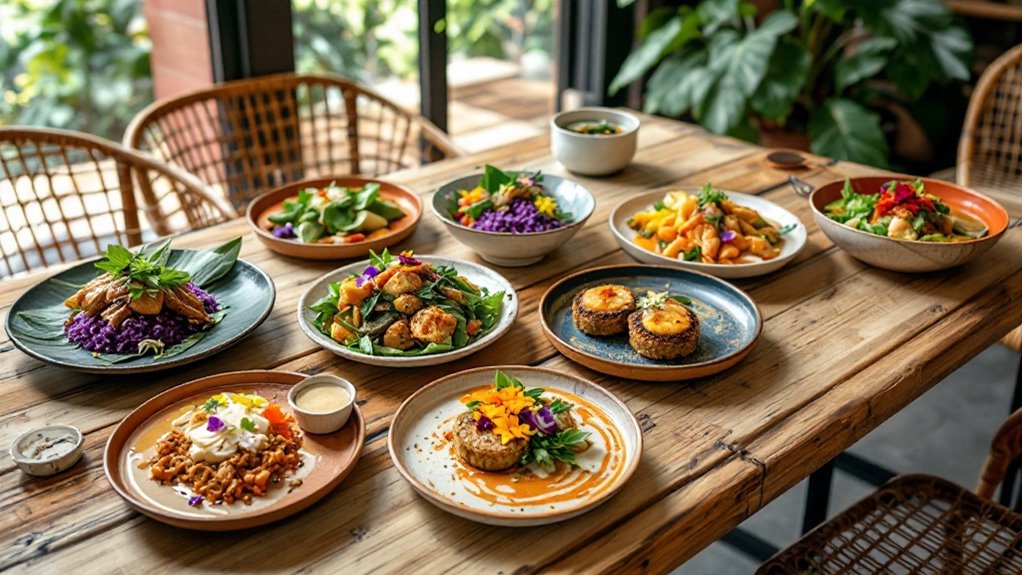
As innovative chefs reimagine Southeast Asian cuisine, fusion vegan restaurants are transforming traditional dishes into contemporary plant-based masterpieces.
You'll discover creative interpretations like Fat Choi's veganized Nyonya Chili Wontons in Toronto and Pietastic's plant-based Malaysian pot pies filled with mock pongteh chicken.
In Bangkok, you won't want to miss Vistro's inventive Thai-Western fusion dishes and sushi, while Borderless in Malaysia serves up exciting nasi lemak wraps that blend local flavors with modern preparation methods. Kuala Lumpur's vibrant vegan scene continues to grow with an increasing number of plant-based eateries opening each year.
For an upscale experience, head to Forest Kitchen in Seoul, where seasonal Korean ingredients shine in Western-style sandwiches and salads. Their commitment to accessibility is evident through their 10,000 to 20,000 won price range for high-quality vegan dishes.
These fusion eateries prove that plant-based dining can honor traditional flavors while embracing modern culinary techniques, offering you a unique taste of Asia's evolving vegan scene.
While traditional Southeast Asian desserts often rely heavily on dairy and eggs, an exciting wave of vegan dessert havens has emerged to satisfy your sweet cravings.
Modern vegan bakeries are reimagining Southeast Asian sweets, proving plant-based desserts can be just as indulgent as traditional recipes.
You'll discover creative plant-based adaptations of beloved classics, from silky taro Mont Blanc cake at Veganday Cuisine in Taichung to flaky pineapple buns at Flourish in Taipei. Ice Monster in Taipei offers their famous Unicorn Sensation, a unique vegan dessert that draws both locals and travelers.
For street-side treats, don't miss Vietnam's sweet potato-coconut cakes or Singapore's comforting Tau Huay silken tofu pudding. Much like pastel de nata alternatives in Lisbon, these treats maintain their authentic taste while being completely plant-based.
In Bali, I Am Vegan Babe and Secret Spot Café serve indulgent options like cinnamon rolls and raw snickers bars.
Traditional favorites have also gotten vegan makeovers, with classics like Bubur Cha Cha and Mango Sago now available in dairy-free versions using coconut milk and fresh tropical fruits.
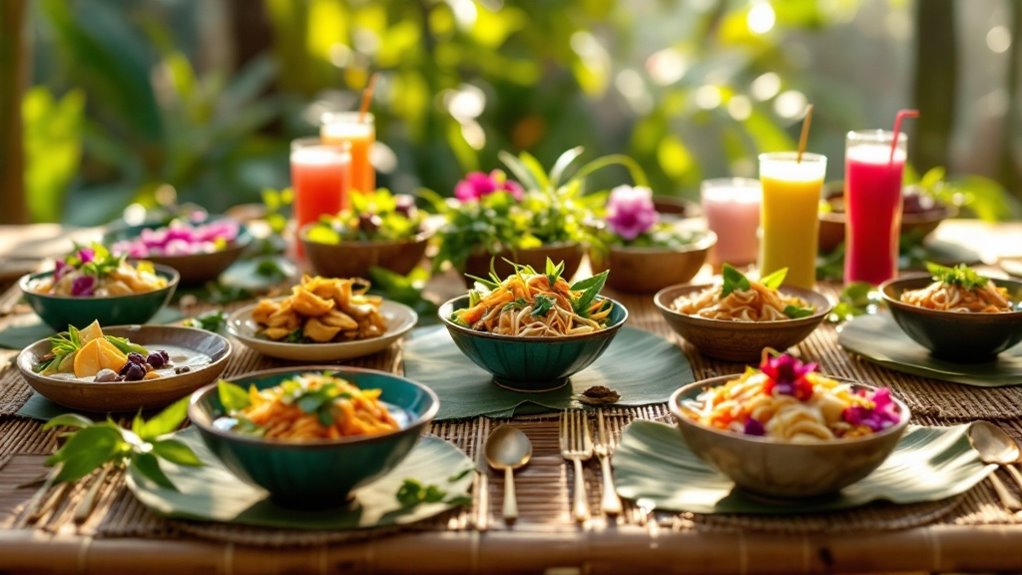
Beyond indulgent desserts, Southeast Asia's raw vegan scene offers transformative dining experiences that'll change how you think about uncooked cuisine.
At establishments like Atsumi Raw Café in Phuket, you'll discover innovative preparations that showcase the region's tropical abundance through creative techniques and lively flavors. While Spanish vegan cuisine continues to influence global plant-based dining, Southeast Asian raw offerings provide a unique regional perspective. These raw havens blend traditional Asian ingredients with modern culinary approaches, delivering nutrient-rich dishes that satisfy both health-conscious travelers and curious foodies. The growing popularity of raw vegan food has sparked a culinary revolution across Southeast Asian destinations.
Through centuries of culinary tradition, Southeast Asia's Buddhist temples have inspired a thriving collection of vegan restaurants that honor ancient cooking principles with modern flair.
These serene establishments bring temple-style dining to urban settings, offering mindful eating experiences that showcase local ingredients and time-honored cooking methods. A perfect example is Seoul's Sanchon, where dining embraces macrobiotic principles in creating authentic temple cuisine.
You'll discover restaurants adapting traditional temple recipes in Bangkok's bustling streets, where chefs transform regional produce into lively, plant-based versions of classic dishes.
Many venues incorporate meditation spaces and traditional Buddhist design elements, creating an authentic atmosphere that enhances the dining experience.
While maintaining core Buddhist cooking principles of avoiding waste and respecting ingredients, these restaurants add contemporary touches to make temple cuisine accessible to modern diners, often featuring innovative presentations of traditional dishes alongside detailed explanations of their spiritual significance.
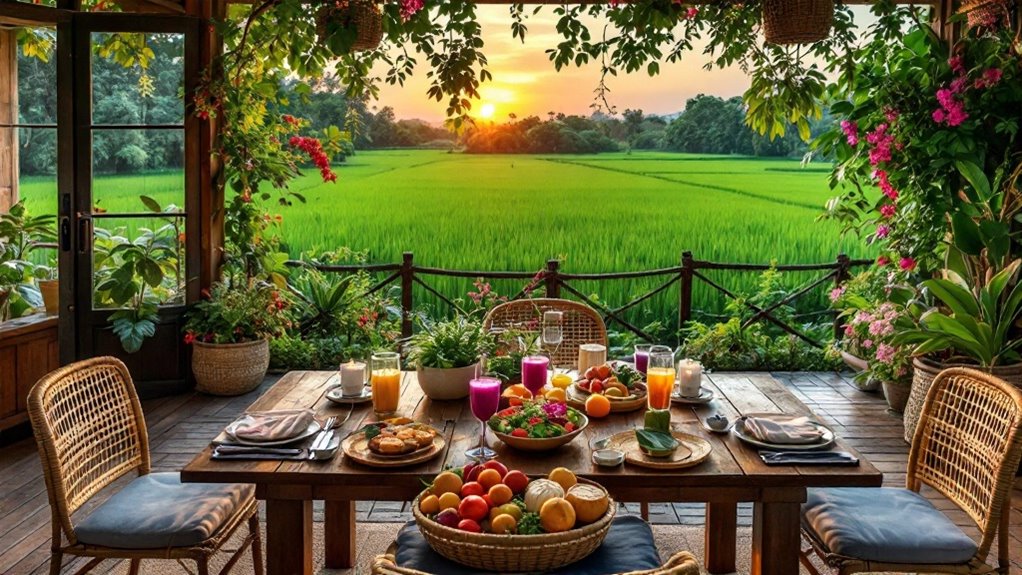
Southeast Asia's farm-to-table vegan establishments have revolutionized plant-based dining by forging direct partnerships with local organic farmers.
You'll discover innovative restaurants like Tam Quang Minh, where chefs transform freshly harvested vegetables into contemporary dishes that honor traditional cooking methods. At Minh Hien and Karma, you can experience the region's commitment to sustainable agriculture while enjoying meals prepared with ingredients sourced within 50 miles of each hotel. Thai Zen demonstrates this philosophy by embracing farm-to-table concept with their own bread-making and organic ingredients.
These restaurants don't just serve meals; they're creating a movement that connects diners directly to their food sources.
You'll taste the difference in every bite while supporting local farmers and sustainable practices.
As Southeast Asia's vegan culinary scene continues to evolve, several standout restaurants have earned prestigious recognition for their innovative plant-based cuisine.
You'll encounter Michelin-starred excellence at Bangkok's Gaa, where Chef Garima Arora crafts contemporary Indian dishes using local Thai ingredients in a stunning heritage building. Much like vegan Barcelona eateries, these establishments masterfully blend local and international influences. Similar to Amsterdam's thriving scene, the region's plant-based offerings continue to attract global attention.
In Manila, Toyo Eatery's award-winning sustainable practices and Filipino vegetable-focused tasting menu showcase the region's commitment to eco-conscious dining. Many digital nomads frequent these establishments, particularly in remote work cafés across Kuala Lumpur.
You can't miss Chef Dave Murugaya's influential work at D'Vegan Academy in Malaysia, where he's revolutionizing traditional Malaysian dishes through a plant-based lens. His dedication to veganizing local cuisine has resulted in over 600 cooking videos showcasing heritage recipes.
For a more casual yet celebrated experience, check out Banana Tree's expanding chain of restaurants, where you'll uncover their famous Vegan Lemak curry alongside an impressive selection of Southeast Asian plant-based innovations.
Whether you're a seasoned vegan or just dipping your toes in plant-based waters, Southeast Asia's vegan dining scene will knock your socks off. From elegant fine dining establishments to humble street food stalls, these top 10 restaurants prove that Southeast Asian vegan cuisine is more than just a passing trend. You'll discover innovative dishes, sustainable practices, and authentic flavors that'll make your culinary journey through the region unforgettable and meaningful.